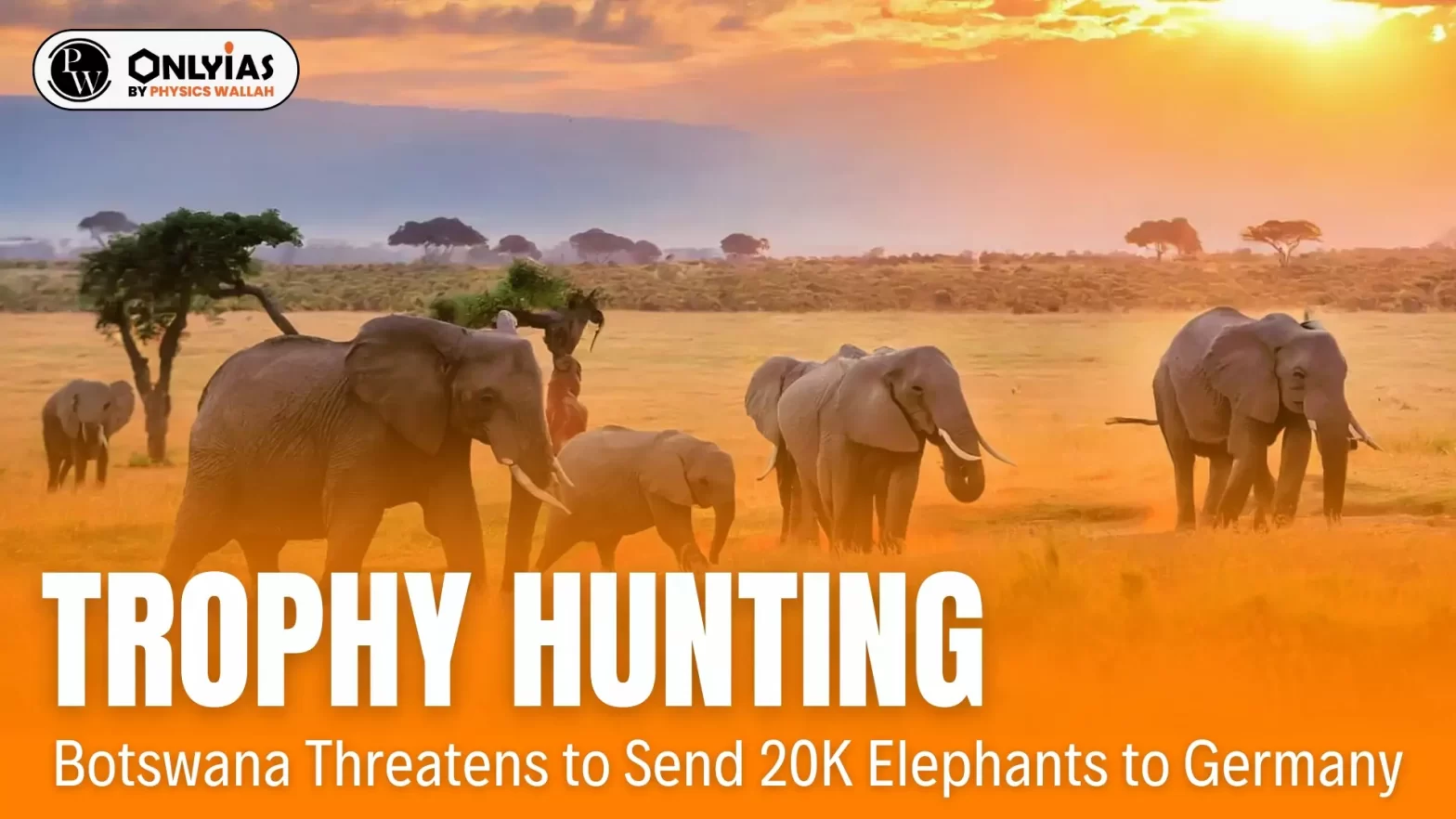Context
Recently, Botswana’s President threatened to send 20,000 elephants to Germany.
Trophy Hunting
- Trophy hunting is a lawful method of selectively hunting wild game species.
- Taxidermied components of such animals, such as the head or carcass, are frequently transported back home and displayed as a “trophy”.
|
Enroll now for UPSC Online Course
Reason for Large Elephant Population in Botswana
- Safe Haven for Elephants: Botswana has been a safe haven for elephants due to its stable government, and small human population.
- Safe Environment: After conflict-spurred mass poaching in Namibia and Angola, elephants stopped crossing the Chobe river, preferring to stay in the safer Botswana instead.
- Implementation of Strict Conservation Policy: Botswana also implemented strict conservation policies. When poaching incidents were on a rise in 2013, it announced a ‘shoot-to-kill’ policy targeting suspected poachers.
- Ban on Trophy Hunting: The country also imposed a ban on trophy hunting — hunting that previously took place under an official government license.
- Elephant Population in Botswana: While in the early 1960s, there were fewer than 10,000 elephants in Botswana, by the mid-1990s, the population had touched 80,000, according to a report by Conservation Frontlines.
Issue with Large Elephant Population in Botswana
- Rise in Human- Animal Conflict: Botswana’s rising elephant population has led to a spike in human animal conflict.
- Menace for Rural Communities: The Elephant has become a menace for the country’s rural communities, regularly damaging homes, drinking water from pipes, feeding on or destroying crops, and trampling people and cattle to death.
- Loss of Habitat and Biodiversity: A large population of elephants also threatens other species, and leads to significant biodiversity loss and habitat degradation
- For example: Elephants tear down trees for fodder and consume large amounts of water, which can cause a decline in non-elephant wildlife.
Steps taken to Reduce Elephant Population
- Elephant Donation to Other Countries: Botswana has donated elephants to other countries.
- For Example: Botswana gave away around 8,000 elephants to neighboring Angola and, in 2022, it donated 500 elephants to Mozambique
- Lifting Ban on Trophy Hunting: Botswana lifted its ban on trophy hunting in 2019.
- Benefits of Lifting the Ban: It not only helps limit the number of elephants, but also boosts the local economy with hunters, often from other countries, paying as much as $50,000 for each elephant killed.
- Trophy hunters injected $250 million into South Africa’s economy yearly and supported 17,000 jobs
Enroll now for UPSC Online Classes
Benefits of Trophy Hunting
- Benefit for Species: Authorities have also argued that regulated trophy hunting ultimately helps the species that hunters target.
- Help in Conservation efforts: Governments can use rich hunters’ money for conservation, and share profits with local communities, which can prevent habitat loss and better protect animals.
- Economic Benefits: In eight key African countries, trophy hunters contribute at most 0.03 percent of Gross Domestic Product (GDP).
Conclusion
If countries want to ban trophy hunting, they need to have an alternative source of revenue worth hundreds of millions of dollars every year. Banning things without knowing the consequences is actually creating more problems for the species.
Also Read: Amendments In Wildlife Trade Rules
| Prelims PYQ (2022):
With reference to Indian laws about wildlife protection, consider the following statements:
1. Wild animals are the sole property of the government.
2. When a wild animal is declared protected, such animal is entitled for equal protection whether it is found in protected areas or outside.
3. Apprehension of a protected wild animal becoming a danger to human life is sufficient ground for its capture or killing.
Which of the statements given above is/are correct?
(a) 1 and 2
(b) 2 only
(c) 1 and 3
(d) 3 only
Ans: (a) |
![]() 8 Apr 2024
8 Apr 2024

